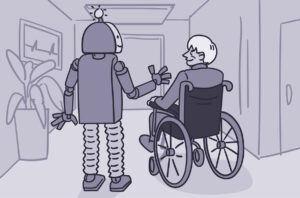Nursing Management
- Nursing Assessment
- Subjective Data
- Important Health Information
- Past health history:
- Precipitating events before bleeding episode
- Previous bleeding episodes and treatment
- Peptic ulcer disease
- Esophageal varices
- Esophagitis
- Acute and chronic gastritis
- Stress-related mucosal disease
- Medications:
- Aspirin
- Nonsteroidal anti-inflammatory drugs
- Corticosteroids
- Anticoagulants
- Past health history:
- Functional Health Patterns
- Health perception–health management:
- Family history of bleeding
- Smoking
- Alcohol use
- Nutritional-metabolic:
- Nausea
- Vomiting
- Weight loss
- Thirst
- Elimination:
- Diarrhea
- Black, tarry stools
- Decreased urine output.
- Sweating
- Activity-exercise:
- Weakness
- Dizziness
- Fainting
- Cognitive-perceptual:
- Epigastric pain
- Abdominal cramps
- Coping–stress tolerance:
- Acute or chronic stress
- Health perception–health management:
- Important Health Information
- Objective Data
- General
- Fever
- Integumentary
- Clammy, cool, pale skin. Pale mucous membranes, nail beds, and conjunctivae. Spider angiomas, jaundice, peripheral edema
- Respiratory
- Rapid, shallow respirations
- Cardiovascular
- Tachycardia, weak pulse, orthostatic hypotension, slow capillary refill
- Gastrointestinal
- Red or “coffee-ground” vomitus.
- Tense, rigid abdomen, ascites.
- Hypoactive or hyperactive bowel sounds.
- Black, tarry stools
- Urinary
- Decreased urine output, concentrated urine
- Neurologic
- Agitation, restlessness. Decreasing level of consciousness
- Possible Diagnostic Findings
- Decreased hematocrit and hemoglobin, hematuria. Guaiac-positive stools, emesis, or gastric aspirate. Decreased levels of clotting factors, ↑ liver enzymes, abnormal endoscopy results
- General
- Subjective Data
- Nursing Diagnoses
- Risk for decreased cardiac output related to loss of blood
- Deficient fluid volume related to acute loss of blood and gastric secretions
- Ineffective peripheral tissue perfusion related to loss of circulatory volume
- Anxiety related to upper GI bleeding, hospitalization, uncertain outcome, source of bleeding
- Nursing Planning
- The overall goals are that the patient with upper GI bleeding will
- Have no further GI bleeding
- Have the cause of the bleeding identified and treated
- Experience a return to a normal hemodynamic state
- Experience minimal or no symptoms of pain or anxiety
- The overall goals are that the patient with upper GI bleeding will




